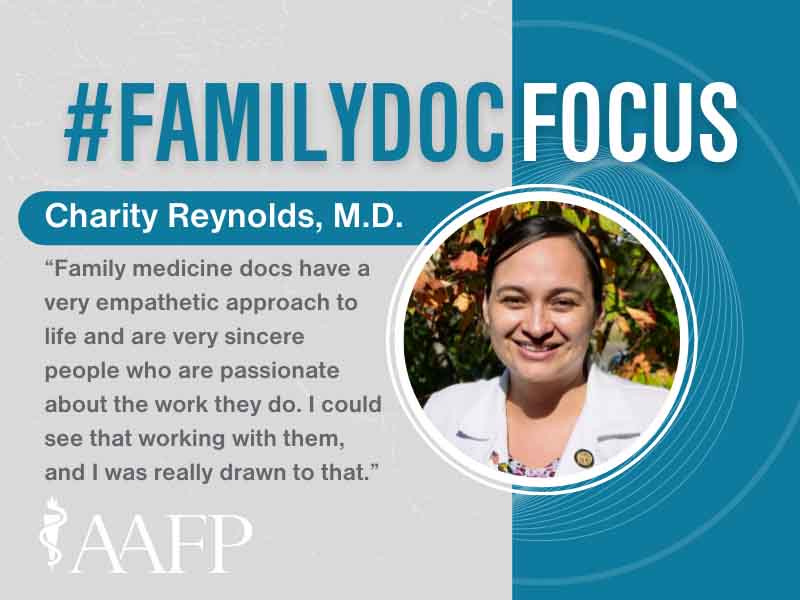Family Medicine Was Path to Help Underserved Patients
April 4, 2022, 4:05 p.m. David Mitchell — Charity Reynolds, M.D., knew about health disparities long before she made it to medical school.

Reynolds grew up in tiny Three Points, Ariz., roughly 45 miles north of the Mexican border and an equal distance southwest of the nearest hospital, in Tucson. More than one-fourth of the area’s children live below the poverty line.
“We didn’t have any clinics there when I was growing up,” she said. “There are so many health disparities that come with being rural. You don’t have access to good food. Your environment for exercise isn’t as good, either. It was difficult for us to get to medical appointments because of how rural we were, and we didn’t have a vehicle. I faced that, and I saw my friends and neighbors facing similar situations. That influenced me to go into medicine so that I could make a difference.”
After completing her training at the University of Arizona Family Medicine Residency in Tucson, Reynolds spent two years practicing full-scope family medicine in La Junta, Colo., to fulfill a National Health Service Corps scholarship obligation.
“I love serving in rural areas, and I was drawn to Colorado because at that clinic I saw many Spanish-speaking patients and was able to use my Spanish,” said Reynolds, who is Latina. “They really still need physicians there.”
Reynolds’ husband, family physician Shane Richardson, M.D., had previously lived in Alaska and has a passion for working with Native American communities. On a trip to visit his family in Minnesota, the couple cold-called the Fond du Lac Band of Lake Superior Chippewa and asked if their clinics were hiring.
“They said, ‘Yeah, come on over,’” said Reynolds, who made the three-and-a-half-hour drive north with Richardson from his family’s home in Rochester. “We had a great tour and spoke to the medical director and the clinic coordinator, and we just loved the clinic and all the services and resources that they provide. It seemed like a great family.”
Four years later, Reynolds is the medical director of two clinics, one in Duluth and the other on the Fond du Lac Band reservation, that care for roughly 7,000 Native people. Reynolds splits her time evenly between administrative work and patient care, including obstetrics at two area hospitals.
Reynolds serves on the Fond du Lac Band’s Emergency Operations Committee and its Public Health Emergency Preparedness Team. She was tasked with establishing protocols for screening employees and patients for COVID-19 and curbside testing.
“It’s been a team effort getting all of us — lab, nurses, leaders, social services, community health, home health, pharmacy — together to make a difference,” she said. “We devised ways to deliver food to people, deliver medications, call them on a daily basis, provide telehealth and education. It was successful because we all have the same mission and goal, and that’s to protect our community.”
Reynolds has been featured in COVID-19 patient education efforts by the American Indian Community Housing Organization and the Minnesota Department of Health that included YouTube videos, billboards, radio segments, social media posts and television commercials.
“As physicians we’re usually well trusted, and it was important for people to hear from someone in their own community,” she said. “I think the more information you can provide and the more avenues you use, the more likely people will listen and respond. I think it helped.”
Reynolds said the patient education campaign worked, in part, because patients were able to submit questions through social media and during radio broadcasts.
“It was driven by the people, for the people,” she said.
Reynolds said the reservation received some of Minnesota’s earliest shipments of COVID-19 vaccine, and the medical staff worked to prioritize Native elders as well as patients who were immunocompromised or pregnant.
“Our clinic actually called every single person that met that criteria, and we talked to them multiple times to get them scheduled for vaccination,” she said. “More than 5,000 phone calls were made to reach every single person.”
With COVID-19 infection rates falling, Reynolds’ clinics are once again open to medical students and residents with an interest in Native or rural health. Most come from the University of Minnesota’s Duluth campus.
Reynolds hopes they will see in her and her colleagues what she saw in family medicine as a student at the University of Arizona College of Medicine in Tucson.
“I really liked that you get to see everything and do everything, from newborns to elders,” she said. “I just couldn’t pick one thing when I was in medical school. I was drawn to the whole family aspect. Family medicine docs have a very empathetic approach to life and are very sincere people who are passionate about the work they do. I could see that working with them, and I was really drawn to that.”